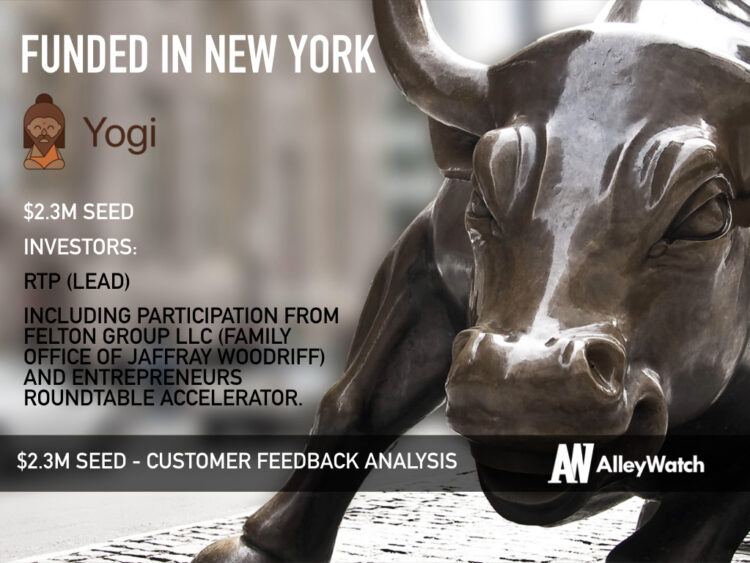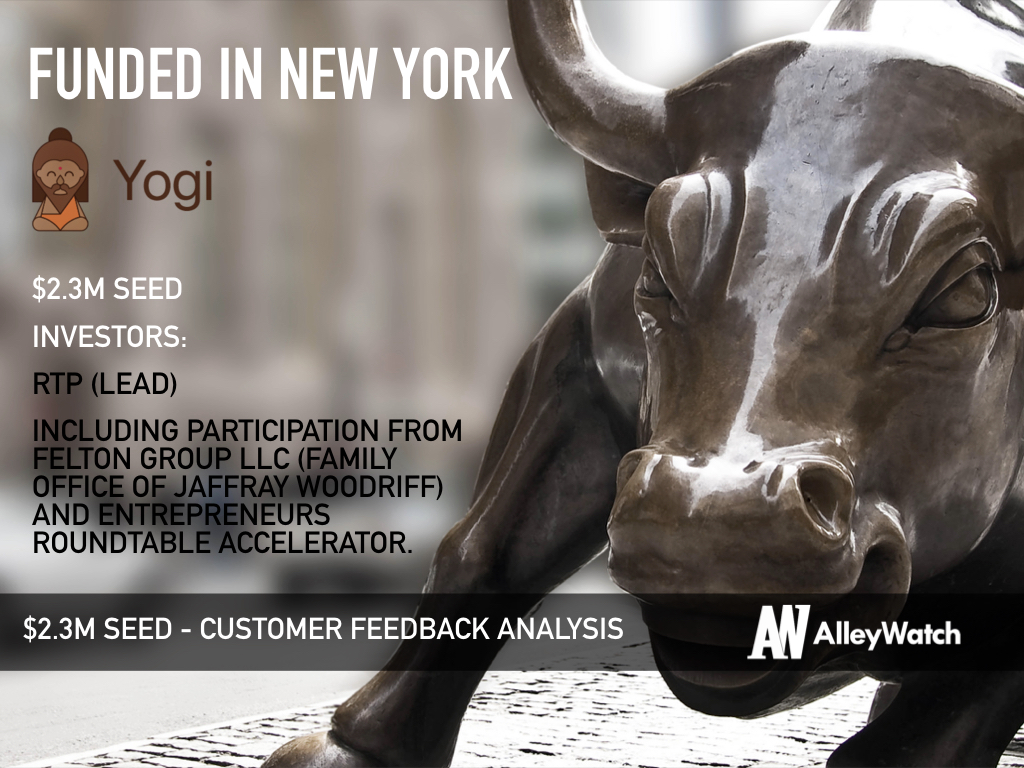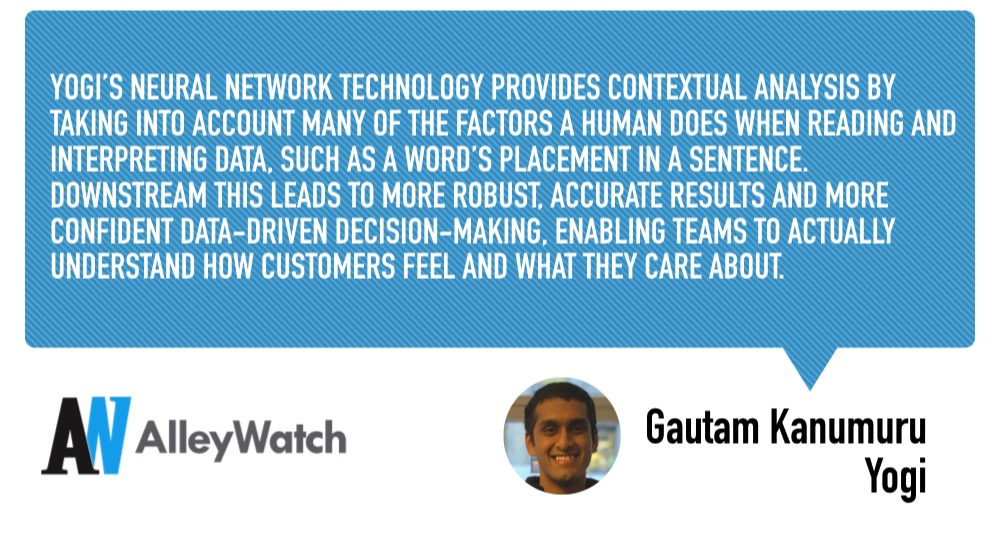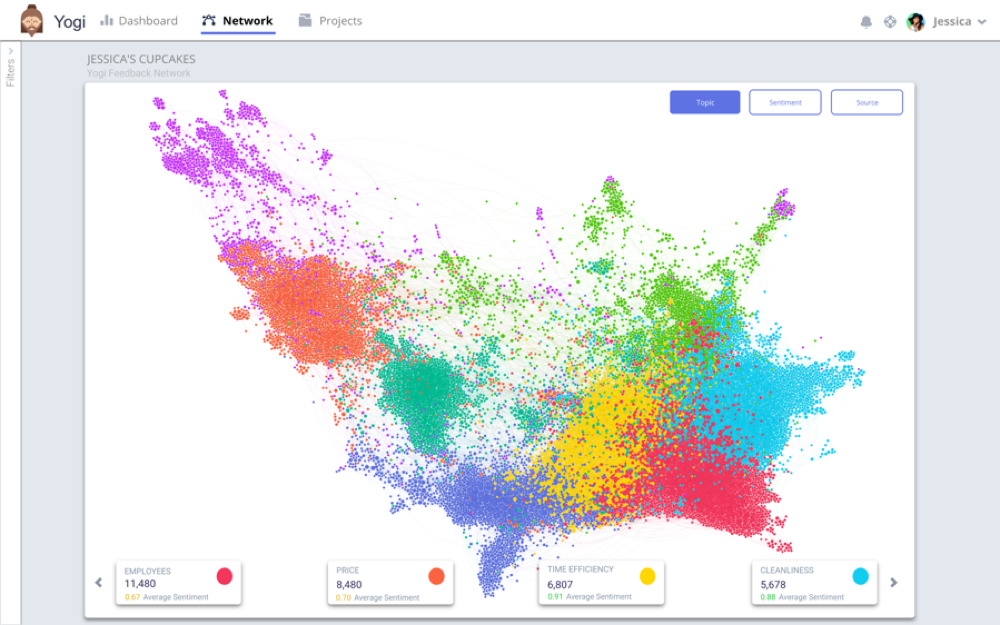Customer feedback is the catalyst for product development but extracting the variety of customer feedback from the scores wealth of channels like reviews, online surveys, emails, and social media is a manual and time-consuming process that threatens the agility of product improvement. Yogi is the software solution applying AI and NLP to unstructured data sets so that teams can understand the crux of feedback and what customers are talking about. Yogi’s neural network technology delivers superb contextual analysis by considering an assortment of factors that a human makes when reading and interpreting data, such as syntax. The Customer Experience market is estimated to be $30B and Yogi has already been used by some of the biggest Fortune500 companies.
AlleyWatch sat down with CEO and Cofounder Gautam Kanumuru to learn more about how Yogi is making the customer feedback process more efficient, the company’s future growth plans, and recent round of funding.
Who were your investors and how much did you raise?
We raised a seed round led by RTP, with follow-on investments from Felton Group LLC (the family office of Jaffray Woodriff), and Entrepreneurs Roundtable Accelerator.
 Tell us about the product or service that Yogi offers.
Tell us about the product or service that Yogi offers.
Yogi is a SaaS tool that companies use to track and quantify customer feedback. As companies push to become more customer-centric, the amount of customer feedback that these organizations obtain has grown exponentially. But at the end of the day, turning this data into actionable insights is still a struggle. Some of the most recognizable brands in the world still rely on 100% human effort to put together and make sense of things like reviews, survey results, and user interviews. With Yogi, we’re setting out to fix this. Yogi uses AI and Natural Language Processing to take the unstructured data from these disparate sources and analyze them at a level previously not possible, diving deeper into what customers are talking about, how they’re reacting to it, and what this could mean for business.
What inspired the start of Yogi?
The inspiration for Yogi actually comes from my time working as a PM at Microsoft. At Microsoft, we relied heavily on NPS surveys, reviews, comments, user interviews, and more to make improvements and explore new product lines. We had great structure in place for generating this feedback data, but when it came time to take that feedback and turn it into actionable business decisions, things fell apart. My only option was to manually read what all our customers had to say and try to build correlations ourselves. As you can imagine, doing this for feedback from thousands of customers got very overwhelming very fast.
Nominations are now open for AlleyWatch’s 2020 NYC Tech Influencers feature. Know someone amazing who belongs on this list? Nominate them today here. Nominations open until 2/4. Looking to drive targeted response from the NYC Tech community at scale, learn more about partnering with AlleyWatch on this initiative here.
After investigating some more, it turned out that this was a problem for more than just Microsoft; CPG companies, retail companies, cable companies, and so many more all suffer from the same problem. Seeing this, combined with advances happening in the NLP and deep learning space, led to Chad (my cofounder) and I starting Yogi.
How is Yogi different?
Yogi differentiates itself across two dimensions, natural language processing technology, and dashboard visuals.
The Yogi platform is centered on advanced and scalable natural language processing algorithms, allowing it to provide granular analysis of unstructured customer feedback regardless of volume or source. Unlike existing business intelligence platforms that rely on frequency counts and statistical analysis to build visuals like word clouds, Yogi’s neural network technology provides contextual analysis by taking into account many of the factors a human does when reading and interpreting data, such as a word’s placement in a sentence. Downstream this leads to more robust, accurate results and more confident data-driven decision-making, enabling teams to actually understand how customers feel and what they care about.
Our visuals also allow for a really granular analysis of feedback data. The most unique of these is what we call the Yogi Feedback Network, which is a control that enables users to see how individual pieces of feedback fit into larger topics of conversation. Along with the Feedback Network, Yogi allows users to customize their dashboard and add controls for them to slice-and-dice their data however they see fit.
What market does Yogi target and how big is it?
We operate in the Customer Experience/Customer Feedback market, which we estimate to be almost $30B in size.
Who do you consider to be your primary competitors?
Clarabridge and Stratifyd are two companies that are also in the feedback analysis space. Other companies that help in gathering feedback, like BirdEye and Yotpo, also offer some analysis tools.
However, from a competitive point of view, we’re more focused on our personal roadmap and making sure that we execute for our customers. We feel like the rest will fall in place.
What’s your business model?
We follow a typical subscription-based SaaS model.
What was the funding process like?
Our funding timeline really kickstarted with ERA demo day in May 2019. That was our first time publicly talking to so many investors. We were able to draw the interest of RTP based on our demo day presentation and went through a really in-depth evaluation/due diligence process with them. At the same time, we got commitments from both ERA and Jaffray and ended up closing our round with three investors. End to end the process took a few months.
What are the biggest challenges that you faced while raising capital?
Raising funding is definitely a time-consuming process. The team was still two people, Chad and I, when we were going through the fundraising process. So balancing meeting investors with sales, product development, and customer support was very hard to do.
What factors about your business led your investors to write the check?
Our team and our technology are really what got investors interested. RTP, Felton Group, and ERA took the time to understand the NLP backbone that powers Yogi and how it will allow us to differentiate from the competition. They also appreciated the fact that we were technical cofounders with previous start-up experience. Chad and I being best friends for 8+ years probably also helped to solidify that we were a team that knew how to work together.
They also appreciated the fact that we were technical cofounders with previous start-up experience. Chad and I being best friends for 8+ years probably also helped to solidify that we were a team that knew how to work together.
What are the milestones you plan to achieve in the next six months?
There are a number of milestones we want to hit in the next six months. Top of mind for us at this point is: growing our team on both the engineering and sales side, iterating on our onboarding experience to make it even easier for users to start using Yogi, and increasing our company presence via marketing and conferences.
What advice can you offer companies in New York that do not have a fresh injection of capital in the bank?
At the end of the day, you need to offer a product/service that users love in order to build a great company. So, make sure to focus on talking to users and iterating as you search for product-market-fit. Once you have something that customers are obsessed with, everything else will fall into place. There are a thousand different ways to build a great company, so raising large rounds of funding from VCs isn’t the end-all-be-all.
There are a thousand different ways to build a great company, so raising large rounds of funding from VCs isn’t the end-all-be-all.
Where do you see the company going now over the near term?
Today we know that our product works and that feedback analysis is a problem that plagues a wide range of companies. Looking forward, our focus now shifts to proving our value proposition across a diverse set of industries. This means making it easier for users to get access to the Yogi platform while also adding more functionality to our product.
What’s your favorite restaurant in the city?
I’m all about getting my day started right, so nothing beats a Sausage, Egg, & Cheese Bagel at New York City Bagel and Coffee House in Astoria.
Nominations are now open for AlleyWatch’s 2020 NYC Tech Influencers feature. Know someone amazing who belongs on this list? Nominate them today here. Nominations open until 2/4. Looking to drive targeted response from the NYC Tech community at scale, learn more about partnering with AlleyWatch on this initiative here.





